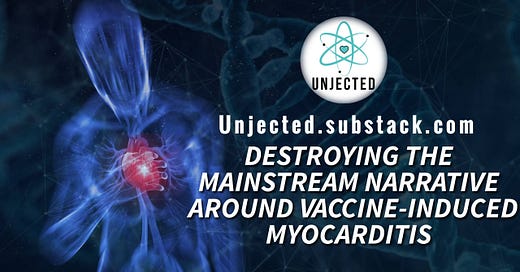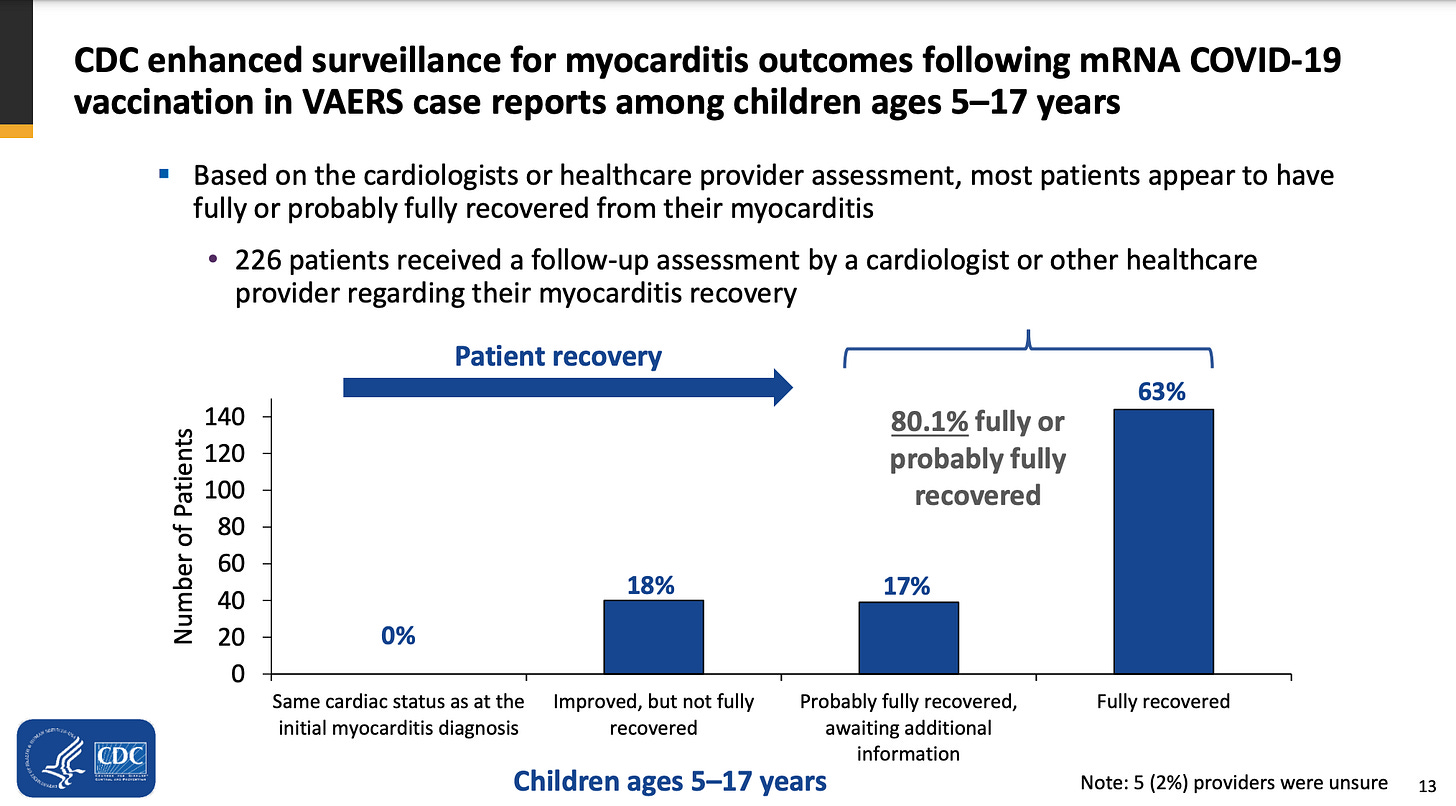Destroying the Mainstream Narrative Around Vaccine-Induced Myocarditis
The media wants to tell you that the risk of myocarditis is greater from COVID infection than it is from the deadly shots. They also tell you that myocarditis is "temporary." Let's take a closer look.
Article by Scott Armstrong | Rebunked News/The Unjected Show | @RebunkedNews
For the latest on the EPIC Unjected Relaunch, visit Unjected.com
Follow: Twitter: @Unjected | IG: @UnjectedOfficial | Telegram: t.me/TheUnjected
The Myocarditis Myth
It has been an excruciating two-and-a-half years, watching in horror as people all around us: public figures, athletes and children suffer debilitating injuries, permanent disabilities and death as a direct result of the COVID-19 injections. Not only is there a lack of urgency towards finding out the facts of the situation, but any attempts to seek answers are wiped from the conversation at every turn.
We are punching through the silence here at Unjected.
One of the most impactful adverse events that occurs post-injection is myocarditis. According to Heart.org:
Myocarditis is a serious though rare condition where inflammation develops in the myocardium, or middle muscular layer of the heart wall.
Myocarditis can weaken the heart and its electrical system. As a result, the heart’s ability to pump blood declines.
The condition may be acute and resolve quickly. Or it may be chronic, lasting longer than two weeks. In severe cases, myocarditis may lead to stroke, heart attack, heart failure or death.
The establishment wants you to believe that you are at a higher risk of contracting myocarditis from a COVID-19 infection than you would from the COVID injections. This is simply not true.
According to a paper that is still published on the CDC’s website from August 2021, “During March 2020–January 2021, patients with COVID-19 had nearly 16 times the risk for myocarditis compared with patients who did not have COVID-19, and risk varied by sex and age.”
According to the paper, and thanks to the coverage at The Last American Vagabond Substack, six limitations were present in this paper that could possibly skew the results:
The risk estimates from the study reflect the risk for myocarditis among persons who received a diagnosis of COVID-19 during an outpatient or inpatient health care encounter and do not reflect the risk among all persons who had COVID-19.
Misclassification of COVID-19 and myocarditis is possible because conditions were determined by ICD-10-CM codes, which were not confirmed by clinical data and could be improperly coded.
Encounters for COVID-19, myocarditis, and COVID-19 vaccination occurring outside of hospital systems … are not included within this data set.
Underlying medical conditions and alternative etiologies for myocarditis (e.g., autoimmune disease) were not ascertained or excluded.
The obtained measures of association could be biased because of the choice of the comparison group (all patients without COVID-19) and if physicians were more likely to suspect or diagnose myocarditis among patients with COVID-19. (Biased; not a double-blind random-controlled trial)
Last Fall, Dr. Peter McCullough did an excellent Substack post debunking this claim:
One of the studies Dr. McCullough references, entitled The Incidence of Myocarditis and Pericarditis in Post COVID-19 Unvaccinated Patients—A Large Population-Based Study, shows zero increased risk of myocarditis among SARS-CoV-2 recovered patients and those who never contracted COVID to begin with. This was a large, cohort study of over 196,000 members of Clalit Health Services, the largest of the four state-mandated health-service organizations in Israel. This study ran from March 2020 to January 2021, roughly the same time frame as the aforementioned CDC paper.
From the paper:
Post COVID-19 infection was not associated with either myocarditis (aHR 1.08; 95% CI 0.45 to 2.56) or pericarditis (aHR 0.53; 95% CI 0.25 to 1.13). We did not observe an increased incidence of neither pericarditis nor myocarditis in adult patients recovering from COVID-19 infection.
This chart, included in the paper, shows that over a period of six months, there was no increased risk of myocarditis among people who had tested positive for COVID versus those that did not have COVID:

Myocarditis From COVID Injections
It is widely accepted, at this point, that myocarditis is a risk associated with the COVID injection, particularly among younger male populations. Here are some excerpts from a slideshow on the CDC Website related to the further study of myocarditis, focusing on 5-17 year-olds.
What we see here is a dramatic spike in reported cases of myocarditis within 1-3 days post-injection, primarily affecting boys aged 12-17.
Another study entitled COVID-19 vaccine boosters for young adults: a risk benefit assessment and ethical analysis of mandate policies at universities, makes a strong case for the overall “Net Harm” of administering booster shots in younger populations. The Last American Vagabond also covered this issue.
Operating within the narrative that these shots actually do have some efficacy, the paper claims that it would statistically take up to 42,000 booster shots to prevent ONE hospitalization from SARS-CoV-2. That is mind boggling. Now, within those 42,000 shots, they estimate that 18.5 serious adverse events would occur, including 1.5–4.6 booster-associated myocarditis or pericarditis cases:
To prevent one COVID-19 hospitalisation over a 6-month period, we estimate that 31 207–42 836 young adults aged 18–29 years must receive a third mRNA vaccine. Booster mandates in young adults are expected to cause a net harm: per COVID-19 hospitalisation prevented, we anticipate at least 18.5 serious adverse events from mRNA vaccines, including 1.5–4.6 booster-associated myopericarditis cases in males (typically requiring hospitalisation).
Another paper published in the American Journal of Preventative Medicine entitled “A Systematic Review and Meta-analysis of the Association Between SARS-CoV-2 Vaccination and Myocarditis or Pericarditis” concluded:
The current evidence suggests that COVID-19 vaccination is associated with an increased risk of myocarditis or pericarditis. Also, compared with the first dose, people who received the second dose have a higher risk for developing myocarditis or pericarditis. Therefore, decisions about COVID-19 vaccination should include a risk assessment of the benefits of COVID-19 vaccination in all age and sex groups.
There is no doubt that people who receive the injection are at a higher risk of developing myocarditis, but how much of a long-term risk is it?
Debunking the Mainstream “Mild/Temporary” Myocarditis Claim
Many of us are well aware of the mainstream narrative around the notion that “yes, well, the shots do cause myocarditis, but, you know, it’s very rare, mild and usually goes away very quickly!”
Let’s put that narrative to rest.
According to CNN:
(There are very rare cases of myocarditis, an inflammation of the heart muscle most often seen in the adolescent male. These, too, tend to resolve on their own and do not cause long-term effects.) Broadly speaking, these should not be a major consideration for parents.
And according to MSNBC’s Rachel Maddow:
The other thing I like to tell parents is that [the vaccine] is very safe. Even though there were some cases initially of myocarditis reported, they were mild and resolved with run of the mill anti-inflammatories…
Going back to the slideshow presentation on the CDC website mentioned earlier, we see that some 19-20% of children who suffered from myocarditis as a result of the shot did not or “probably” did not recover from those injuries.
The CDC framed the argument in such a way that 80.1% fully or “probably” fully recovered, which is one of the most unscientific and ambiguous designations possible when documenting such a serious matter. But that leaves around 20% who still have persistent, potentially permanent or even life threatening injuries.
Now granted, we are talking about small numbers of reported cases here, but the fact is, and always will be, that the standard of informed consent was most likely not met when children or their parents were pressured into receiving these shots. We are not convinced that parents had all of the information going into the clinic to jab a needle into their child’s arm.
Ryan Cristián from The Last American Vagabond also makes a very key point in this discussion. He states that in order to derive risk of heart inflammation from a “COVID infection”, a person would need to “get COVID” first. The risk of deriving heart inflammation from a COVID shot happens every single time a shot is administered.
We know that infection or severe outcomes among children is such a minuscule, almost statistically insignificant number, that they have almost zero risk of COVID-induced myocarditis to begin with.
With each shot that they receive, their chances of permanent injury or death goes up exponentially.
Dr. McCullough, once again, has done some excellent coverage recently on the persistence of myocarditis and completely shatters the narrative that it is “temporary”:
So this flies in direct opposition to the claim that the CDC made that “80.1% of myocarditis patients fully or PROBABLY fully recovered. Shouldn’t they parse that out a bit further?
Maybe they meant that 0.1% fully recovered and 80% “probably” recovered. Sounds like they are saying “Hey, they probably did recover! We don’t know! We didn’t ask.”
In his article, Dr. McCullough references a paper entitled “Cytokinopathy with aberrant cytotoxic lymphocytes and profibrotic myeloid response in SARS-CoV-2 mRNA vaccine-associated myocarditis” citing that 80% of the patients studied with myocarditis post COVID injection were studied using late gadolinium enhancement (LGE), a method used when scanning the heart using Cardio Magnetic Resonance (CRM) imaging, suggesting permanent scarring on their heart and setting themselves up for a potential lifetime of cardiac-related concerns.
According to Dr. McCullough:
While the authors clearly show high levels of inflammatory markers, my attention was drawn to the follow-up MRI scans. As shown in the figure, only 20% had resolved their abnormalities (late gadolinium enhancement) at over six months (199 days). This paper raises questions: 1) is there ongoing heart damage and inflammation at six months? 2) does the LGE in 80% represent a permanent “scar” putting these children at risk for future cardiac arrest? These data strongly call for large scale research into this emerging problem given the large number of potential young persons at risk.

According to the Journal of Cardiovascular Magnetic Resonance: “Late gadolinium enhancement (LGE)… is a widely used cardiovascular magnetic resonance (CMR) technique to distinguish macroscopic scarring and myocardial infarction (MI) from normal myocardium.” The use of this technique during the ongoing monitoring of the patients involved in the study suggests that scarring has occurred from myocardial injury from the COVID injections. From the study:
Longitudinal clinical follow-up months after vaccination revealed persistent cardiac imaging abnormalities in some patients, most notably LGE on CMR imaging, suggesting cardiac fibrosis. We additionally observed elevations in various serum extracellular matrix remodeling enzymes (MMP1, MMP8, MMP9, and TIMP1), increased inflammatory classical monocytes (CCR2+ CD163+) carrying a profibrotic signature, and elevation in sCD163, indicative of cardiac macrophage activation. Our clinical, cellular, and molecular findings potentially point to ongoing wound healing, tissue remodeling, and scar formation after cardiac injury in these patients
At the very least, we do not have enough long-term data to suggest whether or not the public should be constantly bludgeoned with the notion that COVID injection-induced myocarditis is mild and temporary. We have enough evidence to suggest the contrary, and regulatory agencies should be bending over backwards to get us the answers. Alas, it is now up to independent media outlets like The Last American Vagabond, the Team here at Unjected and doctors outside of the system like Dr. Peter McCullough to do it.
We are honored to take up that position in this fight.
Aloha Unjected Fam:
Thank your for your ongoing support of Unjected. We want to invite you join the Unjected Substack for as little as $5.55 a month to help support all of our contributors and help us elevate Unjected.com towards being the best community-building site online. Consider upgrading to the Founding Member tier for a FREE month of Unjected Premium and receive an exclusive Unjected Founding Member shirt as well!
Get your Spike Support from The Wellness Company at DestroySpike.com!
Use Promo Code UNJECTED anywhere on the site (TWC.health) for 10% off!











